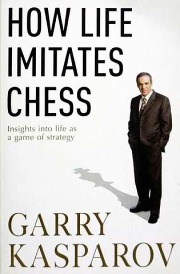Garry Kasparov’s book gives food for thought.
A FEW weeks ago, I came across this book by Garry Kasparov, world chess champion from 1984 to 2000. Kasparov, possibly the greatest chess player we’ll ever know, has retired from the professional chess circuit.
He no longer plays competitively since 2005 and restricts his chess activities to coaching, playing in publicity events, accepting world-wide speaking engagements, writing articles and books on chess, and plunging into the deep end of Russian politics.

As a political activist, he is one of the most outspoken critics of the Russian government. In 2007, he tried to enter the Russian presidential race but had to pull out because he couldn’t rent a meeting hall for his 500 supporters to assemble and endorse his candidacy, as was legally required. It was alleged that the Russian government had applied pressure to deter anyone from renting his party a hall for the gathering.
Despite his flailing political career, there was no denying that as a chess authority, nobody was greater than Garry Kasparov himself. And when he put his thoughts on paper, people would read.
In his younger days, he had authored many instructional books on chess. However, none of them could surpass the later dedication that he gave to his My Great Predecessors series, a five-volume tome written over four years in which he analysed and dissected the lives and games of all the world’s chess champions before him.
There was also one other book he wrote after he retired from competitive play. In 2007, he came out with How Life Imitates Chess. If this is supposed to be a chess book, then it is one with a big difference. There is none of the technical chess stuff here. Instead, Kasparov says that life is a game of strategy, and chess strategy provides powerful lessons to guide people through life’s challenges.
As this book was considered mainstream reading material, I guess that was why the bookstore had a problem cataloguing it. It wasn’t displayed among the other books in the Hobbies or Games section. If I remember correctly, it was catalogued under the Self-Improvement section.
I haven’t been disappointed reading this book. In it, Kasparov draws inspiration from his personal experience as a chess champion to convince his reader that there is indeed a correlation between chess and life.
Siegbert Tarrasch, one of the most influential chess teachers of the late 19th and early 20th centuries, wrote this immortal line in his own book: “Chess, like love, like music, has the power to make men happy.” Of course, this alluded to chess imitating life.
Kasparov would have none of this. To him, it is the reverse. Life, according to Kasparov, imitates chess and not the other way around.
There are little gems all over the book. I could open it at practically any page and immediately be drawn into the powerful lessons as he connects chess and life together. He takes inspiration from the most decisive moments of his greatest games and tells us: well, that’s how I adopted the experience into my life, too.
I’m sure non-chess players will enjoy the strategic and logical thinking of this great chess mind as he leads us into the decision-making process. Life is about making decisions and taking risks, just like playing chess. In our approach to life, just like our approach to chess strategy, we can be either conservative or impulsive in our thoughts or actions. According to Kasparov, we have to seek a balance somewhere between these two extremes.
If you want to know more about Kasparov’s outlook on life and chess, go get it from the local bookstores.
